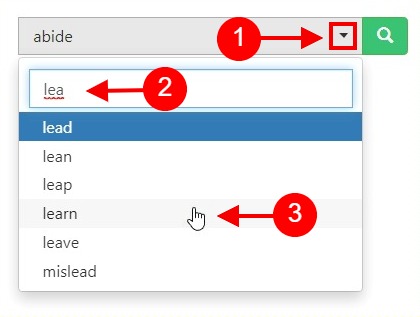上次不规则动词 stand
*这种形式已经过时或在特殊情况下或某些方言使用
相关不规则动词:
不定式
过去式
过去分词
misunderstand
[mɪsʌndəˈstænd]
misunderstood
[mɪsʌndəˈstʊd]
misunderstood
misunderstanden
[mɪsʌndəˈstʊd]
[mɪsʌndəˈstændid]
[mɪsʌndəˈstændid]
understand
[ˌʌndəˈstænd]
understood
[ˌʌndəˈstʊd]
understood
understanden
[ˌʌndəˈstʊd]
[ˌʌndəˈstændid]
[ˌʌndəˈstændid]
